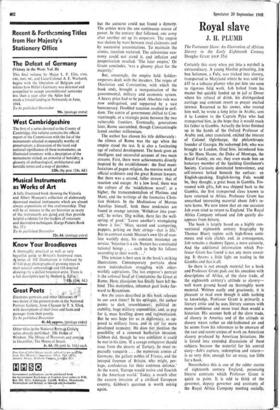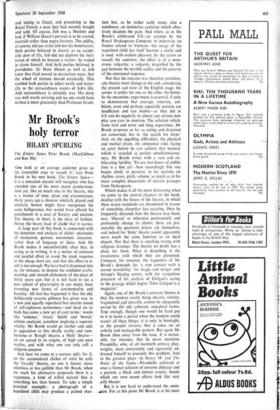The Fortunate Slave: An Illustration of African Slavery in the
Early Eighteenth Century Douglas Grant (ow. 35s)
Royal slave
J. H. PLUMB Certainly this story when put into a nutshell is extraordinary. A young Muslim princeling, Job ben Solomon, a Fula, was tricked into slavery, transported to Maryland where he was sold for £45 to a tobacco planter who put him too soon to rigorous field work. Job bolted from his master but quickly landed up in jail at Dover where his refusal of drink, his distinguished carriage and constant resort to prayer excited interest. Returned to his owner, who treated him well, he wrote a long letter in Arabic, sent it to London to the Captain Pyke who had transported him, in the hope that it would reach his father in Gambia. Actually the letter finished up in the hands of the. Oxford Professor of Arabic and, Once translated, eXited the interest of Colonel Oglethorpe, the philanthropic founder of Georgia. He-tedeempti Job, who was brought to London, feted him,' introduced him to Sir Hans Sloane, the Duke of Montagu, the Royal Family, etc etc; they even made him an honorary member of the Spalding Gentlemen's Society. Curiosity dominated benevolence, and self-interest lurked beneath the surface: an English-speaking, English-loving Fula would be, they thought, a great boon in Gambia. Fes- tooned with gifts, Job was shipped back to the Gambia, the first transported slave known to have returned to Africa. Professor Grant has unearthed interesting material about Job's re- turn home. We now know that on one occasion Job even tried to return to England. The Royal Africa Company refused and Job quietly dis- appears from history.
The book is largely based on a highly con- ventional eighteenth century biography by Thomas Bluett replete with high-flown senti- ments and stale cliches and, in consequence, Job remains a shadowy figure, a mere curiosity. And the additional information which Pro- fessor Grant has found is not any more reveal- ing. It throws a little light on trading in the Gambia and that is all.
So there is not enough material for a book and Professor Grant pads out his anecdote with descriptions of Africa, of the slave trade, of the eighteenth century's attitude to slavery— well worn ground based on thoroughly worn material. Written easily and graciously, it is pleasant to read even though' it adds nothing to knowledge. Professor Grant 'is primarily a literary critic and he uses literary sources with more confidence and more trust than would a historian. His account both of the slave trade, of slavery in America and of the attitude to slavery wears rather an old-fashioned air and he seems from his references to be unaware of the vast and recent corpus of work on American slavery produced by American historians. He is forced into extended discussions of these subjects because the material for his central story—Job's capture, redemption and return— is so very thin; enough for an essay, too little for a book.
Nevertheless this is one of the odder stories of eighteenth century England, possessing bizarre contrasts which Professor Grant is quick to point. It is odd to think of the governor, deputy governor and assistants of the Royal Africa Company meeting socially, and taking to Court, and presenting to the Royal Family a man they had recently bought and sold. Of course, Job was a Moslem and had, if William Hoare's portrait is to be trusted, moorish rather than negro features. The oddity, of course, did not strike Job nor his benefactors. Both parties believed in slavery as an accept- able part of life. Job did not deplore the insti- tution of which he became a victim : he traded in slaves himself. And both parties believed in providence. Sir Hans Sloane as well as Job knew that God moved in mysterious ways, that the wheel of fortune moved erratically. This enabled both parties to adjust easily and natur- ally to the extraordinary events of Job's life. And extraordinary it certainly was. His story was well worth reviving and no one could have written it more graciously than Professor Grant.











































 Previous page
Previous page